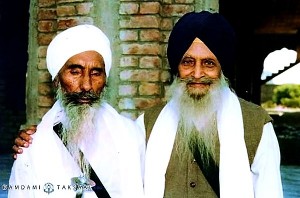 A uniformity of beliefs within the Khalsa Panth is unfortunately not a reality at the present time. In fact, we can see that Sikhs did not have a uniform set of beliefs as far back as the early 18th century when amazing Gursikhs such as Baba Banda Singh Bahadur and other Gursikhs from his time who also received Amrit during the time of Guru Gobind Singh Jee, had disagreements as well. However, Gursikhs have always found ways to be united around what we share.
A uniformity of beliefs within the Khalsa Panth is unfortunately not a reality at the present time. In fact, we can see that Sikhs did not have a uniform set of beliefs as far back as the early 18th century when amazing Gursikhs such as Baba Banda Singh Bahadur and other Gursikhs from his time who also received Amrit during the time of Guru Gobind Singh Jee, had disagreements as well. However, Gursikhs have always found ways to be united around what we share.
Being a part of a group or jatha can be a helpful part of one’s spiritual journey as long as the sangat in that group or jatha helps focus one’s attention on meeting Vaheguru.
Our loyalty to the Khalsa Panth trumps any allegiance to the Akhand Kirtani Jatha or any individual organization. During much of the 18th century, the Khalsa Panth was divided into “Misls” but these Misls would put aside their differences and come together whenever the Panth needed them. In the same way, the Jatha is always at the mercy of the overall Panth and is always willing and eager to come together for the Chardi Kala of the panth when called upon. Older Jatha Gursikhs decry the sad state of affairs today where some youth who are part of one jatha must also be opposed to those from another jatha. As long as the various segments of the Khalsa Panth love one another as brothers and sisters and work together, Jathas are a valuable tool for sangat and Sikhi parchaar (propogation). More effort can be made from all Jathas to ensure the unity and chardi kala of the panth. Recent efforts in this regard were made by Gursikhs from the Akhand Kirtani Jatha in the UK.
The AKJ does not have a membership system. We believe that all Sikhs belong to the Khalsa Panth and that any allegiance to a particular organization is wholly secondary. However, the AKJ is an international jatha spanning many countries and it is an inseparable part of the Khalsa Panth.